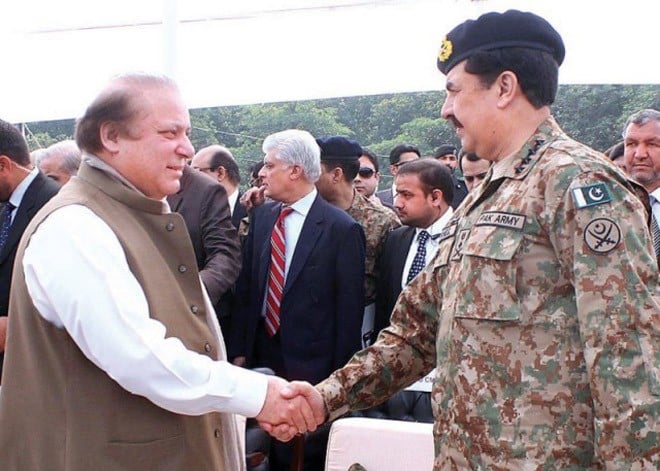
The relationship between the two stakeholders -- both draw their strength from Punjab -- is curious as ever

Nearly halfway through PML-N’s tenure, Pakistan is still without a foreign minister. During this time period, the country has found itself grappling with complex challenges on the international front; the internal political and security situation didn’t help either.
Now that the environment is calmer, consider all that has happened in the last few months -- the NSA-level talks conundrum, the Pathankot attack, Modi’s Lahore visit, Saudi Arabia’s war in Yemen and Chinese investment in Pakistan for the construction of an economic corridor. What is going to happen in the months to come?
The lifting of economic sanctions imposed on Iran, rising US-Russia tensions (vis-à-vis energy and production of gas), talks with Afghanistan and Coalition Support Fund (CSF) disbursements.
Armed with two advisers on matters of foreign policy instead, the ruling party has thus far kept the façade of confidence and self-assurance more or less intact. It is said that Pakistan’s foreign policy options are limited -- it cannot risk antagonising the US or Saudi Arabia. Only relations with a few regional players warrant attention and investment -- Afghanistan, China, India and Iran. The ruling party has tiptoed anxiously around landmines in the realm of international relations and, fortunately, it hasn’t gone up in flames.
If or not that should be a triumph for democracy is the question. In post- democratic transition Pakistan, the more things change, the more they remain the same. While there is talk of power being concentrated in the hands of the prime minister with no foreign minister to make the country’s case effectively on global platforms; in hushed tones all across the country, the real centre of gravity is identified. The country’s most powerful institution -- its military, weighs in heavily on any decisions made whether these are of an external or an internal nature.
Civil-military cooperation in the wake of the terrorism problem at home has been a popular and oft-repeated theme in public discourse, yet both seem to be struggling to manage public opinion in their favour on social, broadcast, and print media.
The relationship between the two stakeholders -- both draw their strength from Punjab -- is as curious as ever. Some argue that this obfuscation makes for a comfortable arrangement where the burden of guilt in the face of undesirable outcomes isn’t just shouldered by one of the two. This line of argument is responded to by the idea that democracy is not an event, that change is incremental, that what has become dysfunctional and rotten in 67 years or so will take a lot more to be fixed.
Yet, when it seems like Pakistan’s foreign policy under the incumbent government has taken on a shift towards geo-economics, the claim must be assessed with an objective mind. Posturing and managing appearances are not uncommon manoeuvers in the political world. What parades as a system of economic reform might be little more than an exercise to engineer desired statistics and manage optics.
Read also: Editorial
Nevertheless, civilian oversight and supremacy are the goals to aspire for. This entails communicating the political leadership’s vision to the public and encouraging meaningful debate. Aiming to bring about clarity in foreign policy goals is instrumental in this regard. In the wake of confusion and ambiguity, foreign policy challenges are only expected to grow and this can be mistaken for lack of will and, even incompetence.
The PML-N may be leading at the moment but it is no hallmark of success to win against an opposition that consists of parties rejected by the public; ones that have been further cut down to size. The only way the ruling party can ensure long-term success is to win space by showcasing competence. A more active foreign ministry, in particular, is the need of the hour.
Ensuring transparency and having a clear vision will be crucial in this regard. National interests must be clearly outlined, economic pursuits scrutinised, the country’s strengths and weaknesses understood and shifting regional dynamics appreciated during the process.